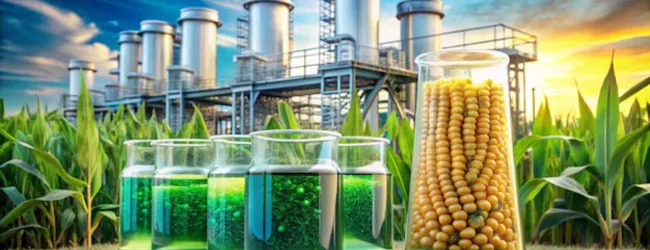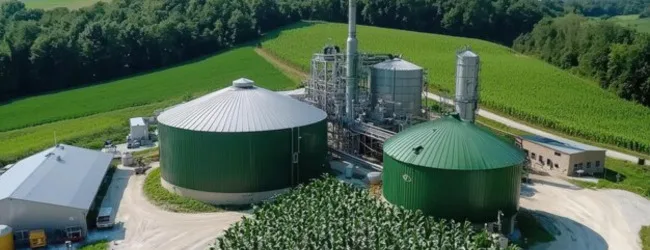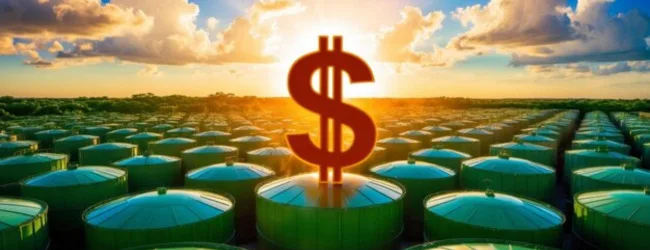Table of contents
- India’s Flourishing Biodiesel Market: Opportunities and Drivers
- Biodiesel Plant Startup Costs: A Detailed Financial Breakdown
- Navigating Regulations and Sourcing: Licenses and Feedstock Acquisition for Biodiesel Manufacturing Business
- 1. Market Research and Feasibility Study for Biodiesel Manufacturing Business
- 2. Legal and Regulatory Compliance
- 3. Technology and Equipment Selection
- 4. Feedstock Sourcing and Supply Chain Management
- 5. Financial Planning and Funding
- 6. Marketing and Sales for Biodiesel Manufacturing Business
- 7. Operational Efficiency and Sustainability
- Need Expert Guidance?
- Conclusion
- Frequently Asked Questions (FAQs)
The growing emphasis on renewable energy and sustainable practices has opened up significant opportunities for entrepreneurs in India. If you’re looking to contribute to a greener future while building a profitable venture, a biodiesel manufacturing business is a compelling option. This guide provides a comprehensive, step-by-step roadmap to help you navigate the process successfully.
India’s Flourishing Biodiesel Market: Opportunities and Drivers

- Government Initiatives:
- The National Policy on Biofuels aims to reduce India’s dependence on fossil fuels and promote sustainable energy sources.
- The government’s focus on blending biodiesel with conventional diesel is creating a steady demand.
- Incentives and subsidies are being offered to encourage biodiesel production and consumption.
- Environmental Concerns:
- Growing awareness of air pollution and climate change is driving the demand for cleaner fuels.
- Biodiesel offers a more environmentally friendly alternative to traditional diesel, reducing greenhouse gas emissions.
- Increasing Demand:
- The transportation sector, industries, and power generation are major consumers of diesel.
- As these sectors grow, the demand for biodiesel is expected to increase significantly.
- Example: Many state run transportation departments are doing pilot projects using biodiesel blends.
- Waste Utilization:
- Utilizing waste cooking oil (WCO) and non-edible oilseeds reduces waste and promotes a circular economy.
- This aligns with the government’s Swachh Bharat Abhiyan (Clean India Mission).
- Rural Economy Boost:
- Cultivation of oilseeds like Jatropha and Pongamia can create employment opportunities in rural areas.
- This can contribute to the economic development of rural communities.
Biodiesel Plant Startup Costs: A Detailed Financial Breakdown

- Land and Building:
- Acquisition or leasing of land: ₹10-50 lakhs (depending on location and size)
- Construction of plant and storage facilities: ₹20-80 lakhs
- Equipment:
- Reactor, filtration system, storage tanks, testing equipment: ₹30-100 lakhs
- Installation and commissioning: ₹5-15 lakhs
- Raw Materials (Initial Stock):
- Oilseeds or WCO: ₹10-30 lakhs
- Licenses and Permits:
- Registration fees, environmental clearances, etc.: ₹1-5 lakhs
- Working Capital:
- Operational expenses, salaries, marketing: ₹10-20 lakhs
- Contingency Fund:
- 10-15% of total cost.
- Total Approximate Startup Cost: ₹86 lakhs – ₹300 lakhs (The cost varies greatly based on plant size, automation, location, and feedstock.)
Navigating Regulations and Sourcing: Licenses and Feedstock Acquisition for Biodiesel Manufacturing Business
- Feedstock Sourcing:
- Farmers and Agricultural Cooperatives: Contact local agricultural departments or Krishi Vigyan Kendras (Agricultural Science Centers) for information on oilseed cultivation and farmers’ groups.
- Waste Cooking Oil (WCO): Establish partnerships with restaurants, hotels, food processing industries, and waste management companies.
- Online Platforms: Explore online marketplaces and B2B platforms for sourcing raw materials.
- Licenses and Permits:
- State Pollution Control Board (SPCB): Apply for environmental clearances and pollution control certificates. The procedure changes slightly between states.
- District Industries Centre (DIC): Obtain industrial licenses and registration certificates.
- Petroleum and Explosives Safety Organisation (PESO): Apply for licenses related to the storage and handling of flammable materials.
- Bureau of Indian Standards (BIS): Adhere to BIS specifications for biodiesel quality.
- Goods and Services Tax (GST): Register for GST through the GST portal.
- Local Municipal Authorities: Obtain necessary permits for building construction and operations.
- Legal Professionals: Consult with lawyers specializing in environmental and industrial regulations to ensure compliance.
- Online Government Portals: Check the websites of the Ministry of Environment, Forest and Climate Change, and the Ministry of New and Renewable Energy for relevant guidelines and regulations.
ALSO READ | Earn Crores with 10 High-Demand Manufacturing Business Ideas Under ₹30 Lakh
Here’s a Step-by-Step Guide to Start a Biodiesel Manufacturing Business
1. Market Research and Feasibility Study for Biodiesel Manufacturing Business
- Understanding the Indian Biodiesel Market:
- India is a major consumer of fossil fuels, creating a substantial demand for alternatives like biodiesel.
- Government initiatives, such as the National Policy on Biofuels, are promoting biodiesel blending and production.
- Analyze the existing supply and demand dynamics, identify potential customers (e.g., transport companies, industries, government agencies), and assess the competitive landscape.
- Feedstock Availability:
- India has abundant sources of non-edible oilseeds like Jatropha, Pongamia, and waste cooking oil (WCO).
- Evaluate the availability and cost of these feedstocks in your chosen location.
- Consider establishing partnerships with farmers or waste collection agencies for a consistent supply.
- Feasibility Study:
- Conduct a detailed financial analysis, including projected startup costs, operational expenses, and potential revenue.
- Assess the technical feasibility of your chosen production process and equipment.
- Evaluate the environmental impact of your operations and ensure compliance with regulations.
2. Legal and Regulatory Compliance
- Business Registration:
- Choose a suitable business structure (e.g., sole proprietorship, partnership, private limited company).
- Register your business with the relevant authorities.
- Licenses and Permits:
- Obtain necessary licenses, including environmental clearances, pollution control board approvals, and industrial licenses.
- Adhere to the Bureau of Indian Standards (BIS) specifications for biodiesel.
- Comply with the Petroleum and Explosives Safety Organisation (PESO) regulations for handling flammable materials.
- GST Registration:
- Register for Goods and Services Tax (GST) to comply with tax regulations.
3. Technology and Equipment Selection

- Biodiesel Production Process:
- The most common method is transesterification, which involves reacting vegetable oil or animal fat with alcohol in the presence of a catalyst.
- Choose a technology that is efficient, cost-effective, and environmentally friendly.
- Equipment:
- Invest in high-quality equipment, including reactors, filtration systems, storage tanks, and testing equipment.
- Consider automation to improve efficiency and reduce labor costs.
- Example: Many Indian companies are starting with smaller scale plants of 1000-5000 litres per day production, and expanding as they gain market share.
- Quality Control:
- Establish a robust quality control system to ensure that your biodiesel meets BIS standards.
- Regularly test your product for properties like viscosity, flash point, and sulfur content.
💡 Pro Tip: If you want to start a business but have too many doubts, connect with a food business expert from Boss Wallah for guidance – https://bw1.in/1116
4. Feedstock Sourcing and Supply Chain Management
- Sourcing Strategies:
- Establish direct relationships with farmers or agricultural cooperatives for oilseed supply.
- Partner with waste collection agencies or restaurants for WCO sourcing.
- Consider cultivating Jatropha or Pongamia on your own land.
- Storage and Transportation:
- Develop a reliable storage and transportation system to ensure the consistent supply of feedstock and the efficient distribution of biodiesel.
- Example: Companies in Maharashtra are working with local farmers to increase Pongamia tree plantations, which provides a consistent supply of seeds.
- Supply Chain Optimization:
- Implement inventory management systems to minimize waste and optimize costs.
- Develop contingency plans to mitigate supply chain disruptions.
5. Financial Planning and Funding
- Startup Costs:
- Factor in costs for land, building, equipment, raw materials, and working capital.
- Funding Sources:
- Explore government schemes like the National Biofuel Policy, which offers subsidies and incentives.
- Seek funding from banks, venture capitalists, or angel investors.
- Consider microfinance options for small-scale operations.
- Operational Expenses:
- Develop a detailed budget for operational expenses, including labor, utilities, and maintenance.
6. Marketing and Sales for Biodiesel Manufacturing Business

- Target Market:
- Identify your target customers, such as transport companies, industries, and government agencies.
- Develop a marketing strategy to reach your target market.
- Branding and Promotion:
- Create a strong brand identity and promote your product through various channels, including online marketing, trade shows, and industry events.
- Example: Many companies are working with state transport corporations to blend their biodiesel into the existing fuel supply.
- Distribution Channels:
- Establish efficient distribution channels to deliver your product to customers.
7. Operational Efficiency and Sustainability
- Waste Management:
- Implement waste management practices to minimize environmental impact.
- Explore opportunities to utilize byproducts, such as glycerin, for other applications.
- Energy Efficiency:
- Optimize your production process to minimize energy consumption.
- Consider using renewable energy sources for your operations.
- Continuous Improvement:
- Continuously monitor and improve your operations to enhance efficiency and sustainability.
Need Expert Guidance?
Starting a business can be challenging, but you don’t have to do it alone! At Boss Wallah, our 2,000+ business experts are ready to provide valuable insights and guidance. Whether you need help with marketing, finance, sourcing, or any other area of any business, our business experts are here to help you succeed- https://bw1.in/1116
Confused about Which Business to Start?
Want to start your own business but unsure which one to choose? Explore Boss Wallah, where you’ll find 500+ courses by successful business owners, featuring practical, step-by-step guides on starting and growing various businesses.
Find your perfect business idea today – https://bw1.in/1111
Conclusion
Setting up a successful biodiesel manufacturing business in India requires careful planning, meticulous execution, and a commitment to sustainability. By following this guide, you can navigate the complexities of the industry and build a thriving venture that contributes to a cleaner and greener future.
Frequently Asked Questions (FAQs)
- What are the primary feedstocks used for biodiesel production in India?
- Non-edible oilseeds like Jatropha, Pongamia, and waste cooking oil (WCO).
- What are the key licenses required for a biodiesel manufacturing business?
- Environmental clearances, pollution control board approvals, industrial licenses, and PESO regulations compliance.
- What is the transesterification process?
- It’s the chemical process of reacting vegetable oil or animal fat with alcohol in the presence of a catalyst to produce biodiesel and glycerin.
- What are the potential funding sources for a biodiesel business in India?
- Government schemes, bank loans, venture capital, and angel investors.
- What are the BIS standards for biodiesel in India?
- The Bureau of Indian Standards (BIS) sets specifications for biodiesel quality, including properties like viscosity, flash point, and sulfur content.
- How can I source waste cooking oil (WCO) for biodiesel production?
- Partner with restaurants, hotels, and food processing industries.
- What is the market potential for biodiesel in India?
- The market is growing due to increasing demand for renewable energy and government initiatives promoting biofuel blending.
- What are the byproducts of biodiesel production, and how can they be utilized?
- Glycerin is a primary byproduct, and it can be used in the pharmaceutical, cosmetic, and chemical industries.


